

What's Your Explanatory Style? Depressed People See the World More Realistically - Tonic. Thinking positive is a surprisingly risky manoeuvre. Do you believe that positive thinking can help you achieve your goals?
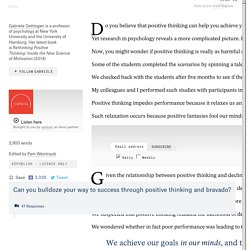
Many people today do. Pop psychology and the $12 billion self-help industry reinforce a widespread belief that positive thinking can improve our moods and lead to beneficial life changes. In her book The Secret Daily Teachings (2008), the self-help author Rhonda Byrne suggested that: ‘Whatever big thing you are asking for, consider having the celebration now as though you have received it.’ Future - Why it pays to be grumpy and bad-tempered. On stage he’s a loveable, floppy-haired prince charming.

Off camera – well let’s just say he needs a lot of personal space. He hates being a celebrity. He resents being an actor. To his ex-girlfriend Elizabeth Hurley's friends he was apparently known as ‘Grumpelstiltskin’. Hugh Grant may be famed for being moody and a little challenging to work with. The pressure to be positive has never been greater. Now you can hire a happiness expert, undertake training in ‘mindfulness’, or seek inner satisfaction via an app. The truth is, pondering the worst has some clear advantages. A Positivity Ratio to Tip You to Flourishing?
Or “The Happiness Tipping Point” NOTE: The idea of Positivity Ratio of 3:1 as a magic gateway to flourishing was challenged in a 2013 American Psychologist article by Brown, Sokal and Friedman.
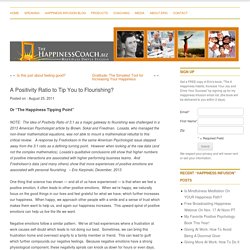
Losada, who managed the non-linear mathematical equations, was not able to mount a mathematical rebuttal to this critical review. A response by Fredrickson in the same American Psychologist issue stepped away from the 3:1 ratio as a defining turning point. However when looking at the raw data (and not the complex mathematics), Losada’s qualitative conclusions still show that higher numbers of positive interactions are associated with higher performing business teams. And Fredrickson’s data (and many others) show that more experiences of positive emotions are associated with personal flourishing. – Eric Karpinski, December, 2013. Self Test. RSA Animate - Smile or Die.
How To Be Optimistic: 4 Steps Backed By Research. Stop Being So Positive - Gabriele Oettingen. By Gabriele Oettingen | 9:27 AM October 27, 2014 We’ve all heard a great deal about the power of positive thinking.

Organizations encourage it among their employees in an effort to boost performance and engagement, and it’s a key tenet of “managing yourself” well; affirmative messages about perseverance, resilience, and vision adorn many an office wall. In the wake of the Great Recession, some businesses even hired happiness coaches to get their workers looking on the bright side. In Praise of Melancholy and How It Enriches Our Capacity for Creativity. By Maria Popova How the American obsession with happiness at the expense of sadness robs us of the capacity for a full life.
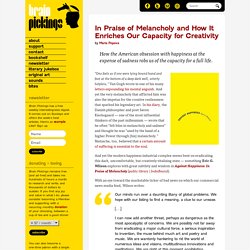
“One feels as if one were lying bound hand and foot at the bottom of a deep dark well, utterly helpless,” Van Gogh wrote in one of his many letters expounding his mental anguish. And yet the very melancholy that afflicted him was also the impetus for the creative restlessness that sparked his legendary art. In his diary, the Danish philosopher and poet Søren Kierkegaard — one of the most influential thinkers of the past millennium — wrote that he often “felt bliss in melancholy and sadness” and thought he was “used by the hand of a higher Power through [his] melancholy.” Nietzsche, too, believed that a certain amount of suffering is essential to the soul. And yet the modern happiness industrial complex seems bent on eradicating this dark, uncomfortable, but creatively vitalizing state — something Eric G. Our minds run over a daunting litany of global problems. This Personality Type Is Linked to Success and Happiness.
Are you a "glass half-full" or a "glass half-empty" kind of person?
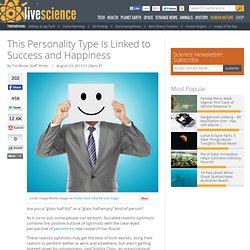
As it turns out, some people can be both. So-called realistic optimists combine the positive outlook of optimists with the clear-eyed perspective of pessimists, new research has found. These realistic optimists may get the best of both worlds, using their realism to perform better at work and elsewhere, but aren't getting bogged down by unhappiness, said Sophia Chou, an organizational psychology researcher at National Taiwan University, who presented her findings at a meeting of the American Psychological Association in Honolulu, Hawaii earlier this month. [7 Things That Will Make You Happy] Negative Emotions Are Key to Well-Being. A client sits before me, seeking help untangling his relationship problems.
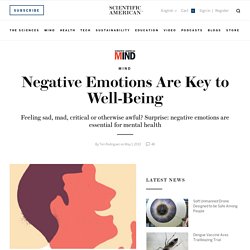
As a psychotherapist, I strive to be warm, nonjudgmental and encouraging. I am a bit unsettled, then, when in the midst of describing his painful experiences, he says, “I'm sorry for being so negative.” A crucial goal of therapy is to learn to acknowledge and express a full range of emotions, and here was a client apologizing for doing just that. In my psychotherapy practice, many of my clients struggle with highly distressing emotions, such as extreme anger, or with suicidal thoughts.
The Positive Power of Negative Thinking. Optimism. It's happened to me many times; maybe it's happened to you. I'll be walking down the street, deep in thought, brow furrowed, lips pressed together as I mentally project myself into the future: How will I handle that meeting next week?